Millions of children, some as young as nine years old, could be forced to watch a pro-life video of a baby in the womb as part of sex education in school.
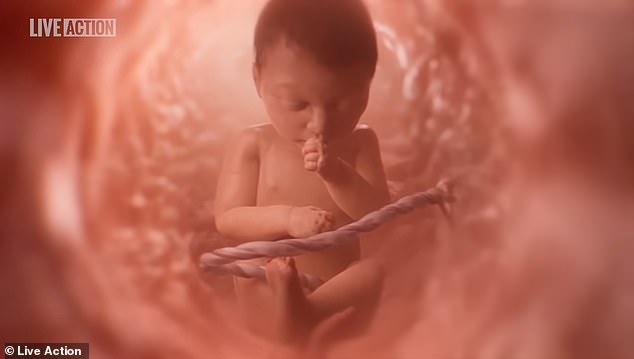
Several states are considering laws that will force schools to show videos of a week-by-week development of a fetus in the womb – however doctors say the milestones are inaccurate
The three-minute clip shows the week-by-week development of a fetus — and has been created by anti-abortion campaigners.
Legislators are considering bills in four Republican-led states which would compel schools to show the ‘Baby Olivia’ short movie to students.
Doctors have labelled the video ‘inaccurate’, and say it suggests developmental milestones are hit two weeks earlier than they actually occur.
It also makes dubious claims that children ‘play’ and ‘explore’ in the womb, which are not proven in scientific studies.
The four states considering the move — Iowa, Kentucky, Missouri and West Virginia — all have abortion bans laws in place, although Iowa’s is currently suspended.
They follow in the footsteps of North Dakota, which passed a law requiring a video of fetal development to be shown in classrooms last year.
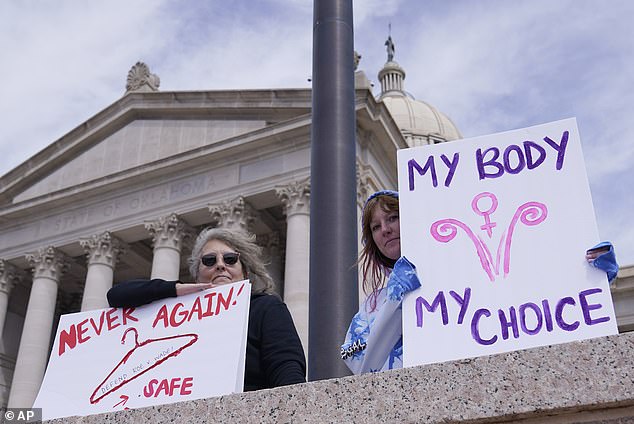
Shown above are campaigners outside the Oklahoma state legislature. They are urging state lawmakers not to ban abortions
The video — made by campaign group Live Action, which says it aims to ‘shift public opinion’ around abortion — begins by showing an animation of a sperm swimming in the female reproductive tract and fertilizing an egg.
The fertilized egg is then shown moving into the womb, where it implants and starts to develop into a fetus.
The video claims the fetal heart starts to beat at three weeks — and that brain activity is detectable from six weeks old.
By the age of 11 weeks, the fetus has already started to play in the womb.
Near the end of the nine month pregnancy, it shows a fully developed infant with a full head of hair.
Doctors at the American College of Obstetricians and Gynecologists have already raised concerns over the video, accusing its makers of ‘manipulating the emotions of viewers’.
They said the clip dates a baby’s development two weeks early, as it marks the day since the egg was fertilized rather than the standard medical measure – the number of days since a woman’s last period.
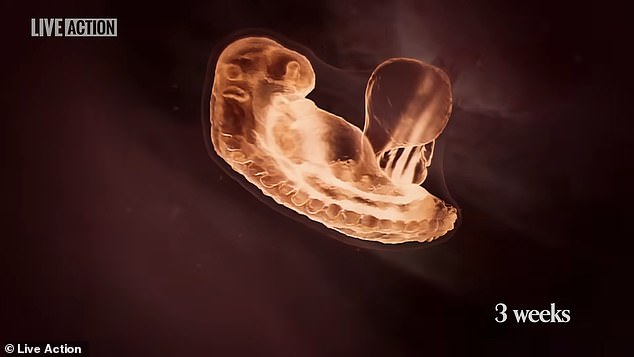
The clip claims the heart starts beating by three weeks. Doctors say the heart actually starts beating at six weeks — or four weeks after fertilization
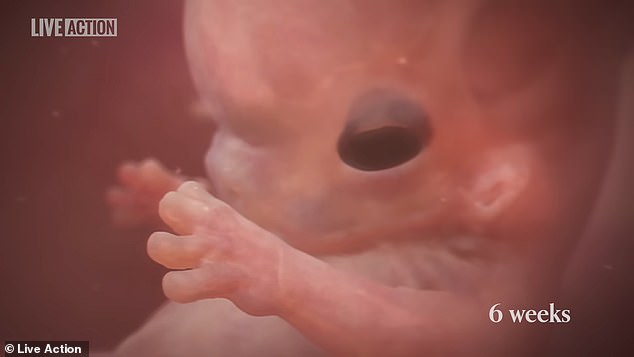
The video also claims that by six weeks there is activity evident in the brain and that the hands and arms can be moved together
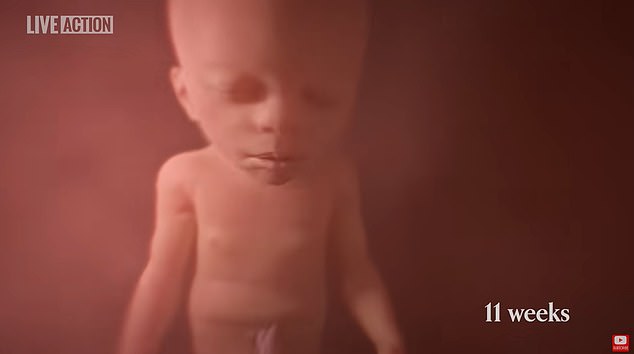
It also claimed that by 11 weeks it is possible to see evidence of play inside the womb
They also disputed references to a ‘fetal heartbeat’ at three weeks old, saying that the heart only develops and starts to beat by the age of six weeks.
Physicians also raised concerns over assigning emotions such as ‘playing’, ‘exploring’ and making ‘speech movements’ to a fetus — saying these had not yet been proven by scientific studies.
There are about 2.3million school children in the four states considering the bill.
In Missouri, the bill being considered in the state legislature would require children to view the video from third grade — or nine years old.
In West Virginia, it would come into force from eighth or tenth grade — or ages 13 to 16 years old, while in Iowa it would be from seventh grade — ages 13 to 14 years old.
Legislators in Kentucky would require children to see a similar video to ‘Baby Olivia’ from sixth grade — aged 11 years old.
Each bill will need to pass votes and committees in houses and senates in each state before becoming law, as well as receive a signature from governors.
It is not clear how long they would take to become law, but in North Dakota —where the law is in place — it was passed within a year.
Live Action says the clip would help to inform curious children about where they came from and encourage an ‘appreciation’ of human life.
Republican rep. in Iowa Luana Stoltenberg was among those to say she was ‘impressed’ by the video Olivia.
‘What’s the worst that can happen?’, she said.
‘Maybe a young child learns how they are developed and grow and so if they become pregnant, they decide maybe I don’t want an abortion?
‘Is that a horrible thing?’
Republican Senator in West Virginia, Patricia Rucker, added that the video was not preaching or partisan — or strongly supportive of the pro-life campaign.
She argued it instead showed human life as a ‘beautiful, miraculous thing’ and was not unlike learning how a chick develops inside an egg.
North Dakota’s law, which came into force late last year, requires schools to include a three-minute ultrasound video and a computer-generated rendering of development in the womb during health and human sexuality classes.
While the law does not require schools to show the video, the state’s Department of Health specifically references it as an option.
The Associated Press contacted 12 of North Dakota’s largest school districts to find out whether they were using the video — and five confirmed they were.
The largest district, Bismarck, which has about 13,800 students, does not use the video, it told reporters.
Written by Luke Andrews for The Daily Mail ~ February 22, 2024
